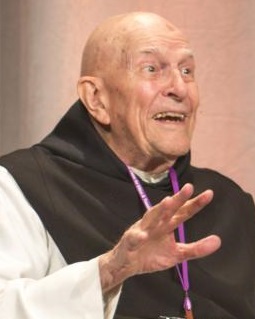Thomas Keating facts for kids
Thomas Keating (born March 7, 1923 – died October 25, 2018) was an American Catholic monk and priest. He was a member of a special group of monks called Trappists. Thomas Keating is best known for helping to create something called Centering Prayer. This is a modern way to pray quietly and deeply, which started at St. Joseph's Abbey in Massachusetts.
Contents
About Thomas Keating's Life
Early Life and Education
Thomas Keating was born in New York City in March 1923. He went to several schools, including Deerfield Academy, Yale University, and Fordham University.
Founding Contemplative Outreach
In 1984, Thomas Keating helped start an organization called Contemplative Outreach. He worked with Gustave Reininger and Edward Bednar to create it. This group is a worldwide network that teaches Centering Prayer. It also teaches another prayer method called Lectio Divina. Contemplative Outreach helps people learn and practice these quiet prayer methods. They offer many helpful materials, workshops, and retreats.
Later Years and Passing
Thomas Keating passed away on October 25, 2018. He was 95 years old. He died at St. Joseph's Abbey in Spencer, Massachusetts, where he had lived as a monk.
Understanding Centering Prayer
Thomas Keating was one of the main people who developed Centering Prayer. This is a modern way of quiet, reflective prayer. It began at St. Joseph's Abbey in 1975. Two other Trappist monks, William Meninger and Basil Pennington, also helped create it.
How Centering Prayer Started
When Thomas Keating first suggested the idea, William Meninger began teaching a prayer method. This method was based on an old book from the 1300s called The Cloud of Unknowing. Meninger called his teaching the "Prayer of the Cloud." He taught it to priests at a retreat house.
Naming Centering Prayer
Later, Basil Pennington led the first retreat for people who were not monks or priests. This happened in Connecticut. The people attending this retreat suggested the name "Centering Prayer." Some people think the famous monk Thomas Merton might have used this phrase before. This suggests the name might have come from him.
 | William M. Jackson |
 | Juan E. Gilbert |
 | Neil deGrasse Tyson |


